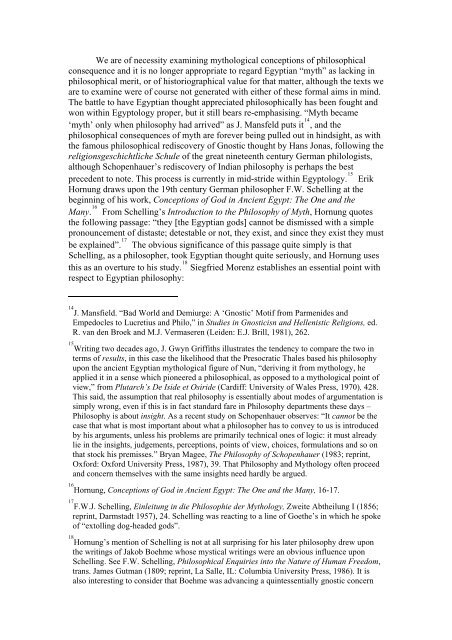THE EGYPTIAN FOUNDATIONS OF GNOSTIC THOUGHT
THE EGYPTIAN FOUNDATIONS OF GNOSTIC THOUGHT
THE EGYPTIAN FOUNDATIONS OF GNOSTIC THOUGHT
Create successful ePaper yourself
Turn your PDF publications into a flip-book with our unique Google optimized e-Paper software.
We are of necessity examining mythological conceptions of philosophical<br />
consequence and it is no longer appropriate to regard Egyptian “myth” as lacking in<br />
philosophical merit, or of historiographical value for that matter, although the texts we<br />
are to examine were of course not generated with either of these formal aims in mind.<br />
The battle to have Egyptian thought appreciated philosophically has been fought and<br />
won within Egyptology proper, but it still bears re-emphasising. “Myth became<br />
‘myth’ only when philosophy had arrived” as J. Mansfeld puts it 14<br />
, and the<br />
philosophical consequences of myth are forever being pulled out in hindsight, as with<br />
the famous philosophical rediscovery of Gnostic thought by Hans Jonas, following the<br />
religionsgeschichtliche Schule of the great nineteenth century German philologists,<br />
although Schopenhauer’s rediscovery of Indian philosophy is perhaps the best<br />
precedent to note. This process is currently in mid-stride within Egyptology. 15<br />
Erik<br />
Hornung draws upon the 19th century German philosopher F.W. Schelling at the<br />
beginning of his work, Conceptions of God in Ancient Egypt: The One and the<br />
Many. 16<br />
From Schelling’s Introduction to the Philosophy of Myth, Hornung quotes<br />
the following passage: “they [the Egyptian gods] cannot be dismissed with a simple<br />
pronouncement of distaste; detestable or not, they exist, and since they exist they must<br />
be explained”. 17<br />
The obvious significance of this passage quite simply is that<br />
Schelling, as a philosopher, took Egyptian thought quite seriously, and Hornung uses<br />
this as an overture to his study. 18<br />
Siegfried Morenz establishes an essential point with<br />
respect to Egyptian philosophy:<br />
14<br />
J. Mansfield. “Bad World and Demiurge: A ‘Gnostic’ Motif from Parmenides and<br />
Empedocles to Lucretius and Philo,” in Studies in Gnosticisn and Hellenistic Religions, ed.<br />
R. van den Broek and M.J. Vermaseren (Leiden: E.J. Brill, 1981), 262.<br />
15<br />
Writing two decades ago, J. Gwyn Griffiths illustrates the tendency to compare the two in<br />
terms of results, in this case the likelihood that the Presocratic Thales based his philosophy<br />
upon the ancient Egyptian mythological figure of Nun, “deriving it from mythology, he<br />
applied it in a sense which pioneered a philosophical, as opposed to a mythological point of<br />
view,” from Plutarch’s De Iside et Osiride (Cardiff: University of Wales Press, 1970), 428.<br />
This said, the assumption that real philosophy is essentially about modes of argumentation is<br />
simply wrong, even if this is in fact standard fare in Philosophy departments these days –<br />
Philosophy is about insight. As a recent study on Schopenhauer observes: “It cannot be the<br />
case that what is most important about what a philosopher has to convey to us is introduced<br />
by his arguments, unless his problems are primarily technical ones of logic: it must already<br />
lie in the insights, judgements, perceptions, points of view, choices, formulations and so on<br />
that stock his premisses.” Bryan Magee, The Philosophy of Schopenhauer (1983; reprint,<br />
Oxford: Oxford University Press, 1987), 39. That Philosophy and Mythology often proceed<br />
and concern themselves with the same insights need hardly be argued.<br />
16<br />
Hornung, Conceptions of God in Ancient Egypt: The One and the Many, 16-17.<br />
17<br />
F.W.J. Schelling, Einleitung in die Philosophie der Mythology, Zweite Abtheilung I (1856;<br />
reprint, Darmstadt 1957), 24. Schelling was reacting to a line of Goethe’s in which he spoke<br />
of “extolling dog-headed gods”.<br />
18<br />
Hornung’s mention of Schelling is not at all surprising for his later philosophy drew upon<br />
the writings of Jakob Boehme whose mystical writings were an obvious influence upon<br />
Schelling. See F.W. Schelling, Philosophical Enquiries into the Nature of Human Freedom,<br />
trans. James Gutman (1809; reprint, La Salle, IL: Columbia University Press, 1986). It is<br />
also interesting to consider that Boehme was advancing a quintessentially gnostic concern










